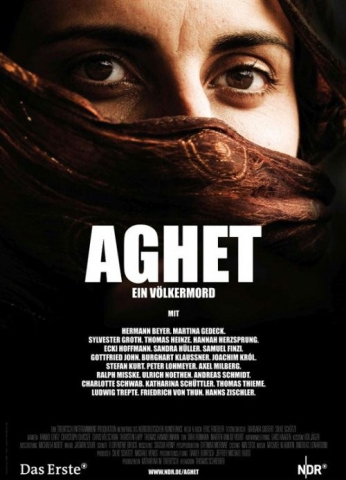Others
Theatre Cinema: VoicEncounters

13, 20, 27 November, 4 December 2013
Lights on the Dark
A programme of films about the Armenian Genocide
Cinema Room
Admission free
Wed 13 November, 7pm
Barking Island (Chienne d’historie)
Animation, directed by Serge Avédikian, France, 2010; 15’
Constantinople 1910. The streets are overrun by stray dogs. The new government decides to deport the dogs to a desert island. Palme d’Or winner at the 2010 Cannes Film Festival.
I Hate Dogs! The Last Survivor
Documentary, directed by Peå Holmquist and Suzanne Khardalian, Sweden, 2005; 29’
Film with English subtitles
Garbis, an Armenian, is the one of the last remaining survivors of the 1915 Armenian Genocide committed by the Young Turks of the Ottoman Empire. As a young boy he was forced on a death march through the desert of Deir ez-Zor, where he, and thousands of others, lost entire families in the massacres of the Armenians.
Having survived the tragic events, Garbis has created a good life for himself in France despite the tragedies and trauma that have left him profoundly affected. Now, at the age of ninety-nine, he has found a new companion, Seta, who lives with him in an apartment just a few blocks from the Arc de Triomphe. With the help of a reading aid, Garbis follows daily news about Turkey’s attempts to join the European Union without acknowledging the very genocide that has left him in anguish for over 90 years.
Theatre Cinema as part of VoicEncounters, practical seminar
Wed 20 November, 7pm
Aghet: A Genocide
Documentary, directed by Eric Friedler, Germany, 2009; 90’
Film in English with Polish subtitles
Aghet is an award-winning documentary made by German filmmaker Eric Friedler, which compellingly proves the truth of the genocide of the Armenian people. Using the actual words of 23 German, American and other nationals who witnessed the events, and armed with archival materials, Aghet expertly takes on the challenge that Prime Minister Recep Erdogan hurled at the world by stating: “Prove it”. Aghet incorporates never-before-seen footage and documents – making it one of the best researched and presented documentaries on the Armenian Genocide. More than just a historic retelling of the Genocide, the film also delves into the ongoing campaign of denial that the Turkish government has mounted since these events occurred the First World War.
Aghet represents a significant contribution to political and cultural awareness not only for Armenians worldwide, but also more importantly for the non-Armenian world community.
Wed 27 November, 7pm
Grandma’s Tattoos
Documentary, directed by Suzanne Khardalian, Sweden, 2011; 58’
Film in English
In conversation with Suzanne Khardalian
During the First World War, millions of Armenians were forced out of their homes in the then Ottoman Empire, into the deserts of what is now Syria and Iraq. More than a million people died in the Armenian genocide. Filmmaker Suzanne Khardalian makes a journey into her own family history to investigate the terrible truth behind her late grandma’s odd tattoos. Her grandma was always a bit strange, never liking physical contact and covered with unusual marks. Everybody in the family seemed to know the story, but no one ever mentioned it. As grandma’s mystery is slowly unveiled, family taboos are broken down and Suzanne exposes the bigger story – the fate of the Armenian women driven out of Ottoman Turkey during the First World War. The painful journey behind Suzanne’s grandma’s tattoos unfolds through Armenia, Lebanon, Sweden and Syria, finally bringing out the truth.
Suzanne Khardalian is an independent documentary filmmaker and journalist who lives and works in Stockholm, Sweden. She studied journalism in Beirut and Paris and worked as a journalist in Paris until 1988 when she began working in film. She holds a master’s degree in international law and diplomacy from the Fletcher School at Tufts University in Boston. Her filmography includes: Back to Ararat (1988), Unsafe Ground (1993), The Lion from Gaza (1996), Her Armenian Prince (1997), From Opium to Chrysanthemums ( 2000), Words and Stones (2001), Where Lies My Victory (2002), I Hate Dogs ( 2005), Bullshit (2006), Young Freud in Gaza (2008), Grandma’s Tattoos (2012). She is also the author of the book Berättandets Befrielse (Deliverance of a Story: Filming Survivors; Stockholm, 2010). Suzanne is currently working on a new film entitled Camel, which shows how the Western media covers the Middle East with particular focus on women.
Wed 4 December, 7pm
The River Ran Red
Documentary, directed by Jakob Michael Hagopian, USA, 2009; 60’
Film in English
The River Ran Red is the epic search for survivors of the Armenian Genocide of 1915 along the Euphrates River. From his archives of 400 testimonies of survivors and eyewitnesses, award-winning filmmaker J. Michael Hagopian weaves a compelling story of terrifying intensity, taking the viewer from the highland waters of the river to the burning deserts of Syria… and to the final resting place of those whose blood ran red in the waters of the Euphrates.
The Witnesses Trilogy is a series of three documentary films written, directed and produced by J. Michael Hagopian and based on his filmed interviews of 400 survivors of and eyewitnesses to the Armenian Genocide of 1915. Hagopian chronicles the near extinction of the Armenian people against the sweeping canvas of the lack of human rights and the absence of democratic traditions and principles in the Turkish Ottoman Empire. The films document the Turkish leaders’ actions as an organized and systematic program of annihilation of the Armenian homeland in the Turkish Ottoman Empire, with transportation of Armenian deportees by rail to the far reaches of the Deir ez-Zor desert and massacres and ethnic cleansing operations along the Euphrates River.
